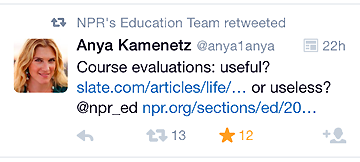 |
A defense of student evaluations: They’re biased, misleading, and extremely useful.
The answer requires us to think about power. If you look hard at the structure of academia, you will see a lot of teachers who, in one way or another, lack power: adjuncts and term hires (a large population, and growing); untenured faculty (especially in universities like mine); faculty, even tenured faculty, in schools where budget cuts loom; graduate students, always and everywhere. You might see evaluations as instruments by which students, or administrators, exercise power over those vulnerable employees. But if you are a student, and especially if you are a student who cares what grades you get or who needs recommendations, then teachers, for you—even adjuncts and graduate teaching assistants—hold power.
Chairmen and deans also need to know when classroom teaching fails: when a professor makes catastrophically wrong assumptions as to what students already know, for example, or when students find a professor incomprehensible thanks to her thick Scottish accent. My note: indeed, when chairmen and deans KNOW what they are doing and are NOT using evaluations for their own power.
Student Course Evaluations Get An ‘F’ : NPR Ed : NPR
Philip Stark is the chairman of the statistics department at the University of California, Berkeley. “I’ve been teaching at Berkeley since 1988, and the reliance on teaching evaluations has always bothered me,” he says.
Stark is the co-author of “An Evaluation of Course Evaluations,” a new paper that explains some of the reasons why.
Michele Pellizzari, an economics professor at the University of Geneva in Switzerland, has a more serious claim: that course evaluations may in fact measure, and thus motivate, the opposite of good teaching. Here’s what he found. The better the professors were, as measured by their students’ grades in later classes, the lower their ratings from students.
“Show me your stuff,” Stark says. “Syllabi, handouts, exams, video recordings of class, samples of students’ work. Let me know how your students do when they graduate. That seems like a much more holistic appraisal than simply asking students what they think.”